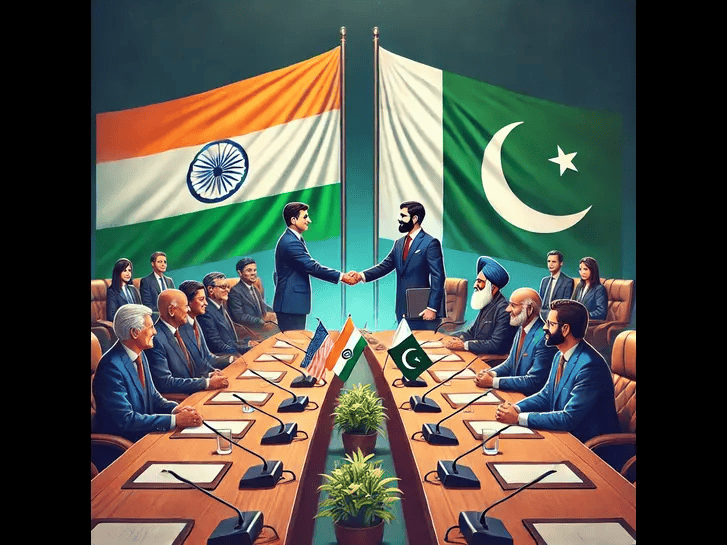The relationship between Pakistan and India has historically been characterized by a complex interplay of diplomatic engagements and border tensions. As of March 25, 2025, recent developments continue to influence the dynamics between these two South Asian neighbors.
Historical Context
Since their partition in 1947, Pakistan and India have engaged in multiple conflicts, primarily over the disputed region of Kashmir. The Line of Control (LoC), serving as the de facto border in Kashmir, has been a hotspot for skirmishes and ceasefire violations. Despite various attempts at peace, including the 2003 ceasefire agreement, maintaining lasting tranquility has been challenging.
Recent Border Tensions
In October 2023, reports indicated that Pakistani and Indian forces exchanged fire along the Kashmir border near the Sialkot-Jammu area. Both sides accused each other of unprovoked firing, resulting in injuries to civilians and military personnel. This incident underscored the fragility of the ceasefire and the persistent volatility along the LoC.
Additionally, in March 2025, a militant hijacking of the Jaffar Express train in Pakistan’s Balochistan province resulted in 31 casualties, including soldiers, railway staff, and civilians. The Baloch Liberation Army (BLA) claimed responsibility for the attack. The Pakistani military accused India and Afghanistan of supporting the insurgents, though both countries denied involvement.
Diplomatic Developments
Diplomatic relations between Pakistan and India have experienced significant fluctuations, particularly following India’s revocation of Article 370 in August 2019, which granted special status to Jammu and Kashmir. In response, Pakistan downgraded diplomatic ties, expelled the Indian High Commissioner, and suspended bilateral trade.
However, in March 2024, Pakistan’s Foreign Minister Muhammad Ishaq Dar indicated a potential shift by expressing willingness to “seriously” consider restoring trade ties with India. This statement highlighted the Pakistani business community’s interest in resuming bilateral trade, signaling a possible thaw in relations.
Economic Considerations
Economic factors play a crucial role in shaping diplomatic relations. India’s recent decision to lift restrictions on rice exports led to a significant drop in global rice prices, impacting producers in countries like Pakistan, Thailand, and Vietnam. This move aims to double India’s agricultural shipments by 2030, potentially affecting regional trade dynamics.
Furthermore, Pakistan has advocated for the expansion of China’s Belt and Road Initiative (BRI) to enhance regional cooperation. During a Shanghai Cooperation Organization (SCO) meeting in October 2024, Pakistan emphasized the importance of infrastructure development, including road, rail, and digital connectivity, to boost regional integration.
Strategic Infrastructure Developments
Infrastructure projects have strategic implications for both nations. In January 2025, Indian Prime Minister Narendra Modi inaugurated the Z-Morh tunnel in Kashmir, enhancing year-round connectivity to the region. This development aims to boost tourism and strengthen military logistics in the strategically important Ladakh area.
Conversely, Pakistan has expressed concerns over India’s relaxation of border security protocols to facilitate the construction of a renewable energy park by the Adani Group near the Pakistan border. This move has raised security apprehensions among military experts in Pakistan.
Security and Counterterrorism Efforts
Both countries continue to face challenges related to militancy and insurgency. In September 2024, a militant ambush on Hindu pilgrims in Kashmir resulted in nine fatalities and 33 injuries. This incident is part of a troubling rise in militant attacks in Kashmir since 2020, with insurgents employing advanced equipment and tactics, challenging Indian forces’ control.
Pakistan’s Balochistan province has also witnessed insurgent activities, with groups like the BLA demanding greater autonomy and resource control. The recent train hijacking incident in March 2025 highlighted the ongoing security challenges in the region.
Conclusion
The relationship between Pakistan and India remains intricate, influenced by historical grievances, territorial disputes, economic interests, and security concerns. While there have been recent indications of potential diplomatic engagement, persistent border tensions and internal security challenges continue to pose significant obstacles to lasting peace. Both nations face the critical task of balancing strategic interests with the imperative of regional stability, necessitating sustained dialogue and confidence-building measures to pave the way for a more harmonious future.






